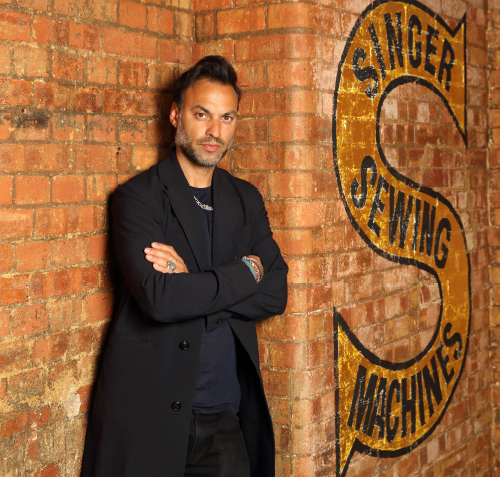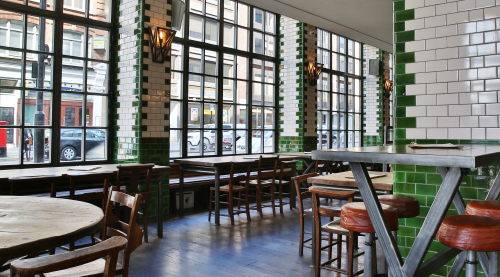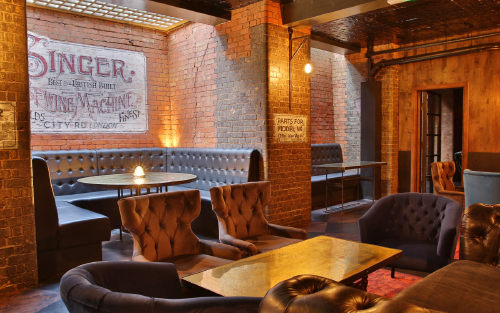The Barworks story
Cateys 2015 Pub and Bar Award winner Barworks is the centre of a burgeoning empire that encompasses pubs, cocktail clubs, diners, a brewery and now a distillery, all founded or managed by Marc Francis-Baum, Andreas Akerlund and Patrik Franzen. We caught up with Francis-Baum at the Singer Tavern to talk about his company's success
Barworks is celebrating its 20th anniversary. Tell us how the business started.
At the time, I was basically a frustrated musician. I was in a band and working in bars was a way of paying my way until I achieved rock stardom. I became more realistic, and realised I'd always enjoyed the social aspect of working in bars. I began to take it more seriously and found a bar and restaurant in a creative work hub, which in 2001 was a new concept.
Andreas and Patrik really didn't want me to go off and do my own thing, so we joined forces and it snowballed from there. We currently have nine pubs as well as bars; over the years we've acquired more and also sold a few.
How did Barworks diversify to start the Diner?
While we were still busy opening pubs and bars, we started the first Diner site in Shoreditch in 2005, and that was just out of our love of the concept - I had a real love of greasy spoon cafés, which we could make work by adding the American element. It was such an amazing success we knew we had to do another one.
We created the Goodlife Group, which operates the Diners, and diversified into restaurants. The Diner now has eight sites and it's going very strongly. We also started a pub company called Gracelands in partnership with another former employee, which has three sites.
How has the bar market in London changed?
I wouldn't say we do traditional pubs, but they're not bars either - they're a modern take on the old-fashioned boozer. For us, it's about longevity. Bars are about Friday and Saturday nights, DJs and music, whereas we do food, craft beer and trade for much longer hours.
Your pubs mainly trade in a fairly tight geographical area. Why is that?
We've always understood the East London market very well. I live in East London and I can see what's going on and there are still opportunities. What's happened in Shoreditch is bigger than what happened in Notting Hill in the 1990s, and there's still loads to happen in areas such as London Fields and Hackney Wick.
We've got a really exciting project in the works on Mare Street in Hackney, which is a huge space that will be a restaurant, bar, deli, coffee bar and juice bar, all under one roof. We may even tap into some local food businesses around there and have them in as concessions.
Is there a common theme that characterises Barworks venues?
Each place is individual. The Diners have a common look, but even there we try and keep them a bit individual. Each of the pubs is like a new painting: we take any interesting features that are already there and expand on them.
The one we're most proud of is probably the Well & Bucket, which is an old grade II-listed pub. When we took the false walls down there were these lovely tiles. Many of them had been stolen or damaged over the years, but we were able to preserve what was there. We put in a lovely new copper bar and gave it a really nice edge. In terms of the food and drink mix, we always look for 70/30 in favour of drink.
With our extensive range of craft beers and spirits, it's mainly about the drink, but we do work to improve our food offer all the time. We're selling a lot of food at the Singer Tavern (pictured), which is in the City, so it has a Monday to Friday trade as well as the breakfast meetings and lunchtime trade. We're very happy to build food sales where we can. Our first City pub, Harrild & Sons in Farringdon, showed us the way on that. For the most part, outside the industry, I don't think people do realise that we're a company with different venues. You definitely wouldn't walk into any of our pubs and say "Oh, this is a Barworks." We focus on the local market in each one.
How did the Camden Town Brewery come about?
About four years ago we started looking into making our own beer. We had great beer sales and turnover and thought it would be interesting to brew our own. We weren't talking about a brewery on anything like the scale that it has become, but we could see there were consumers who wanted to drink lager that wasn't just another lager from a big brewer.
We had a friend, Jasper Cuppaidge, who had the Horseshoe pub in Hampstead, and he had a little brewery in his basement. We all met up, and he knew of a bespoke brewery you could buy from a company in Munich. It was way more than we were thinking, and our banks were sceptical, but we asked them "what's the hardest thing, making it or selling it?" We were already selling it very well in 12 or 14 outlets.
So we went in with Jasper, found the site, and had a bespoke brewery built into the arches under Kentish Town West station.
I won't say that making good-quality beer is easy, but having a group of bars to give the brewery a sales and marketing platform was really important. Four years on, Camden Town Brewery beer is in M&S and Waitrose stores, it's sold in Sweden, Japan and Australia, and we're talking to corporate investors to raise funds for further expansion.
With the sale of Meantime, we're now the biggest independent brewery in London. We achieved that in four years. A year ago, an employee of ours, Alex Wolpert, wanted to start a distillery to make craft vodka, gin, whisky and so on. We started the East London Liquor Company with him last year and it's going really well. Whisky takes three years to age, but we're already selling the casks, so people can visit their whisky while it's maturing. As with Camden Town Brewery, we're just setting out to create a really nice product and we'll see what happens.
The challenge for every London operator is recruiting and retaining staff. How do you approach that?
We have about 500 staff now. They seem to stay with us quite a while - we definitely try to look after them. All the general managers and senior management are all very well salaried, incentivised and bonused. Our staff are happy in their jobs, they work in great places with like-minded people, and I think we genuinely look after everyone - it's a well-run company. We offer cocktail training, beer training and so on, which everybody seems to be into.
In terms of recruitment, a lot people come to us looking for jobs, and we give them opportunities to progress. Someone who started with us collecting glasses and worked her way up through bar work and unit management into operations is now going to manage our HR. Both our operations managers have been with us for many years.
Our approach is, if we need a full-time stock controller, rather than hire a recruitment company, why not train one of our own people? We'll send them to college and give them the training. It sends a message out that if you work behind the bar, why not make a career of it? One day, you could have my job!
Is there a clear growth strategy?
With the Diners, there definitely is. We've had quite a few approaches over the past year from some prominent investors looking to roll them out, and the question for us is do we give up half of the Diners business in order to roll them out? We love doing pubs, we love doing the Diners. Our plan for the Diners is to roll them out and to exit the business at some point, but at the same time we can't stop doing pubs. The discipline of having an external partner will help. With Camden Town, we've had to take outside investment to build a much bigger brewery to keep up with demand.
With the pubs, we get offered new places all the time and there are some you just have to do. There is a lot of competition for sites with regards to the Diners. We've got four or five offers out at the moment and maybe two will come off. We work with private landlords, we don't have any tied pubs, and we don't get many approaches from pubcos. I like to think that if I worked at Enterprise or Punch, I'd look at companies like us and say "let's give these guys 10 pubs, they know what they're doing."
Two Floors, which is our oldest site, is still turning in amazing growth figures. Over the past couple of years the whole of London has got even more buzz and excitement about it. It was tough four or five years ago, but everyone loves a drink - when they're happy and when they're sad, they have a drink.
More people in London than ever are self-employed, especially in the creative industries, and that favours our venues. Customers are around all day, and looking for somewhere to work and meet, as well as to eat and drink. We'll see a lot more social working spaces or hubs, and that's something we pioneered way back in the 1990s.
With the Diners there's a plan: to grow the business and eventually sell it, but with the pubs, we just love doing it. There's no master plan.
What is Barworks?
Barworks was founded 20 years ago when Swedish entrepreneurs Andreas Akerlund and Patrik Franzen built on the success of a coffee shop venture with the opening of the Two Floors bar in Soho. Two Floors manager Marc Francis-Baum became the third partner in 2000, when he identified a new concept which his employers decided to invest in.
Barworks now operates some of London's trendiest drinking establishments, such as the Well & Bucket and the Exmouth Arms, with the 5CC Cocktail Club concept co-located with a number of the pubs.
Through interlinked companies the business now also includes casual dining concept the Diner, the Camden Town Brewery, and craft spirits distiller the East London Liquor Company.
Facts and figures
Turnover
- Barworks: £15m
- Goodlife (the Diner): £16m
- Group like-for-like growth: 7%-8%
Barworks venues
(including Gracelands joint venture pubs)
- The Black Heart, Camden Town
- Electricity Showrooms, Hoxton Square
- The Earl of Essex, Islington
- The Exmouth Arms, Exmouth Market
- Harrild & Sons, Farringdon
- The Kings Arms, Bethnal Green
- The Slaughtered Lamb, Clerkenwell
- The Three Johns, Islington
- Two Floors, Soho
- The Railway hotel, Essex
- The Singer Tavern, Moorgate
- Well & Bucket, Bethnal Green
- Wenlock & Essex, Islington
- 5CC Cocktail Club (five co-located sites)













